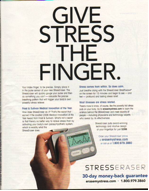Stress Eraser
Gary Wolf
December 17, 2007
The Stress Eraser has been around for more than a year now, garnering positive feedback attracting heavyweights to the advisory board [PDF]
of its parent company, and advertising heavily.  . In one sense, the Stress Eraser is a classic QS device, a geeky quantitative aid to self-improvement. I almost want one. But the very thing that probably makes it an easy sale, right now, is just the thing that’s keeping me on the sidelines.
. In one sense, the Stress Eraser is a classic QS device, a geeky quantitative aid to self-improvement. I almost want one. But the very thing that probably makes it an easy sale, right now, is just the thing that’s keeping me on the sidelines.
The Stress Eraser is a heart rate monitor that cues breathing exercises for stress reduction With a case, buttons, and display by Frog Design and a $299 sticker price, it’s a high status object. You place your finger on the edge, and information from your pulse is used to suggest a breathing pattern. According to many reviewers, it works.
The inventor of the device is Michael Wood, who, in admirable QS fashion, began monitoring his blood pressure in order to track his own stress. This lead him to the research on stress and biofeedback, and ultimately provoked him to develop a commercial tool that, unlike many similar systems, is completely portable and does not require a link to a computer. Clinical trials are underway to validate its effectiveness for both stress reduction and as a treatment for sleep disorders.
But although the Stress Eraser is being tested by researchers, it contains no way to store and track a record of a user’s response over time. In a video on the Stress Tracker web site, Michael Wood explains why not:
One questions that sometimes we get asked is why don’t you add a lot more numbers and meters and basically other stressful components, and that’s the reason why we don’t. The screen displays have to be soothing, they have to be simple and geometric…
I understand this reason. Many people would be intimidated by the suggestion that they track their own history of stress response, rather than simply obey commands. But there ought to be some way to offer this possibility as a hidden option, for fans and devoted self-experimenters. This is a $300 dollar device that cannot use what it learns about you to help you get new ideas about how/when/where you become stressed. Nor can it connect you to the trials that are measuring its effectiveness. Nor can it give you access to your data so that you can evaluate it for yourself.
John Biggs of Gizmodo tried out the Stress Eraser, and wasn’t too impressed. He says it’s kind of like doing whippets. I think he is probably wrong to be so dismissive. But at $300, I want this device to be linked.


